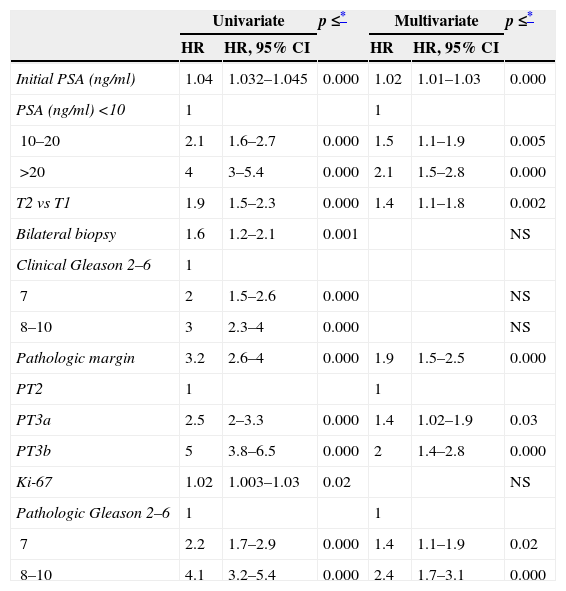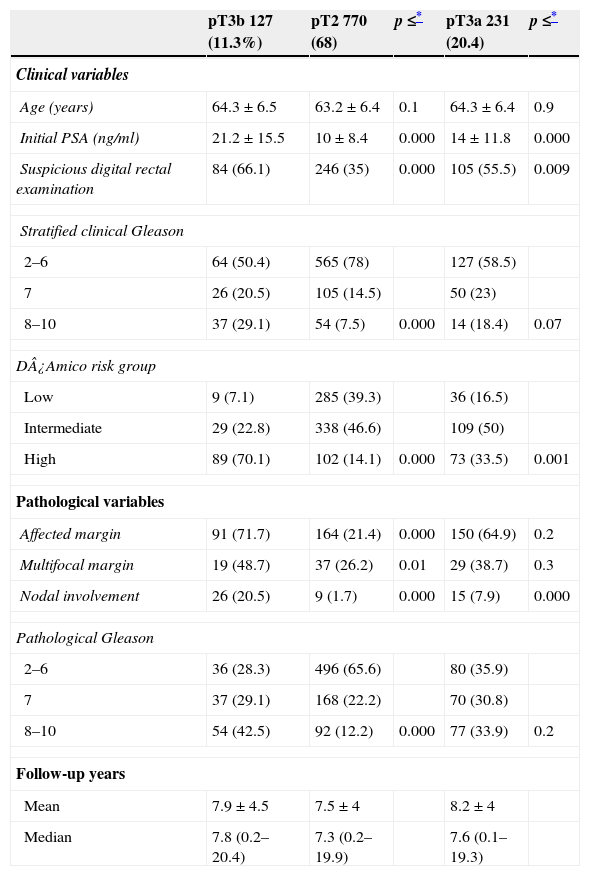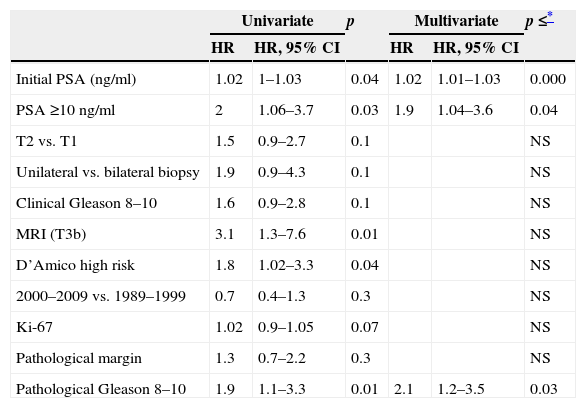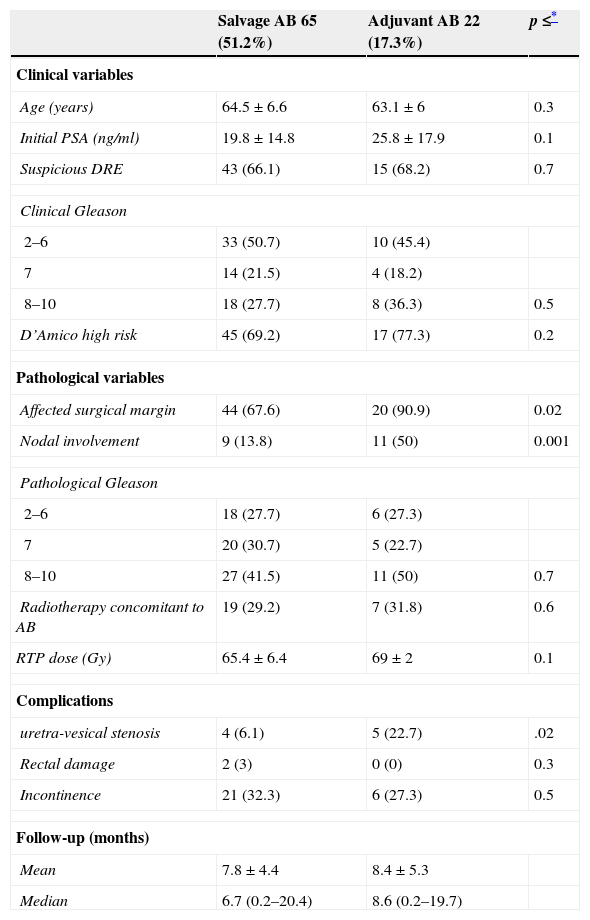To study the influence, in terms of prognosis, of the finding of seminal vesicle involvement in patients with prostate adenocarcinoma treated with radical prostatectomy.
Material and methodWe reviewed a series of patients with seminal vesicle involvement with clinically localized prostate adenocarcinoma who underwent radical prostatectomy between 1989 and 2009, focusing on their clinical–pathological characteristics, biochemical progression-free survival (BPFS) and specific survival (SS). We assessed the variables that influenced BPFS and designed a risk model.
ResultsA total of 127 out of 1.132 patients who underwent surgery (11%) presented seminal vesicle invasion (i.e., pT3b). In the multivariate study of the entire series (Cox model), pT3b affects the BPFS (HR: 2; 95% CI: 1.4–3.3; P=.001). Other influential factors were the affected borders, initial prostate-specific antigen levels, pathological Gleason score and the presence of palpated tumor. The pT3b tumors have poorer clinical–pathological variables when compared with pT2 and pT3a tumors. Sixty-five percent of the patients evidenced biochemical progression. The BPFS was significantly poorer for pT3b (40±4% and 28±4% at 5 and 10 years, respectively) than for pT2 and pT3a (P<.0001). The SS was also poorer in patients with pT3b tumors (91±2% and 76±4% at 5 and 10 years, respectively) (P<.0001). The predictors within the pT3b patient group were: PSA levels >10ng/ml (HR: 1.9; 95% CI: 1.04–3.6; P=.04) and pathological Gleason score 8–10 (HR: 2.1; 95% CI: 1.2–3.5; P=.03). We designed a risk model that accounts for the variables involved, which entails 2 groups with different BPFS (P=.004): Group 1 (0–1 variable), with a BPFS of 46±7% and 27±8% at 5 and 10 years, respectively; and Group 2 (2 variables), with a BPFS of 14±7% and 5±5% at 5 and 10 years, respectively.
ConclusionSeminal vesicle involvement severely and negatively affects the BPFS and SS. We designed a risk model with the independent influential variables in BPFS (pathological Gleason score 8–10 and PSA levels >10ng/ml). This model confirms that pT3b tumors are a heterogeneous group, which includes an important group with better prognosis when surgical treatment is performed.
Estudiar la influencia en términos de pronóstico del hallazgo de afectación de vesícula seminal en pacientes con adenocarcinoma de próstata tratados mediante prostatectomía radical.
Material y métodoSe revisa una serie de pacientes con afectación de vesícula seminal con adenocarcinoma de próstata clínicamente localizado sometidos a prostatectomía radical entre 1989-2009, con énfasis en sus características clinicopatológicas, la supervivencia libre de progresión bioquímica (SLPB) y la supervivencia específica (SE). Se evalúan las variables influyentes en la SLPB y se diseña un modelo de riesgo.
ResultadosUn total de 127 pacientes sobre 1.132 intervenidos (11%) mostraron invasión de vesícula seminal; es decir, fueron pT3b. En el estudio multivariado de toda la serie (modelo de Cox) pT3b influye en la SLPB (HR: 2; IC 95%: 1,4-3,3; p=0,001). Otros factores influyentes fueron márgenes afectos, PSA inicial, Gleason patológico y presencia de tumor palpable. Los tumores pT3b presentan peores variables clinicopatológicas cuando se comparan con pT2 y pT3a. El 65% ha evidenciado progresión bioquímica. La SLPB es significativamente peor en pT3b (40±4% y 28±4% a 5 y 10 años) que en pT2 y pT3a (p<0,0001). La SE también es peor en pacientes pT3b (91±2% y 76±4% a 5 y 10 años) (p<0,0001). Dentro del grupo de pacientes pT3b las variables predictivas son: PSA>10ng/ml (HR: 1,9; IC 95%: 1,04-3,6; p=0,04) y Gleason patológico 8-10 (HR: 2,1; IC 95%: 1,2-3,5; p=0,03). Se ha diseñado un modelo de riesgo que tiene en cuenta las variables implicadas, que conlleva 2 grupos con diferente SLPB (p=0,004): a) grupo 1 (0-1 variables). SLPB: 46±7% y 27±8% a 5 y 10 años; y b) grupo 2 (2 variables). SLPB: 14±7% y 5±5% a 5 y 10 años.
ConclusiónLa afectación de vesícula seminal influye de manera severamente negativa en la SLPB y en la SE. Se diseña un modelo de riesgo con las variables de influencia independiente en la SLPB (Gleason patológico 8-10 y PSA>10ng/ml). Este modelo confirma que los tumores pT3b son un grupo heterogéneo, dentro del cual hay un grupo importante de mejor pronóstico cuando se lleva a cabo tratamiento quirúrgico.
















